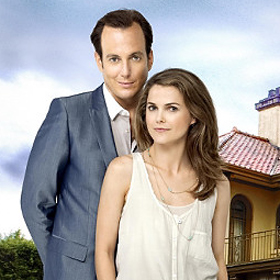Running Wilde

4/5
The ad promos were clever and funny. The resumes were impeccable. The night it airs, Tuesday, and the network it airs on, Fox, already has Glee, a hit show with long coattails that are ready to be ridden on. In a fall season with limited new options, Running Wilde has a bit of a leg up on its competition.
Written by a triumvirate of Arrested Development alumni—Mitch Hurwitz, Jim Valley and Will Arnett, who also starred in AD—Running Wilde is a sitcom in the same style. Absurd plot elements, miraculously un-self aware characters and nonstop verbal and visual gags make AD, and possibly Running Wilde, ripe re-runs.
Arnett plays Steve Wilde, an heir to the Wilde Oil fortune who has never worked a day in his life. He lives on a giant estate with all the trappings of a self-indulged millionaire. He has a driver, servants, and a horse.
Cast opposite of Arnett is Keri Russell playing Emmy Kadubic, a liberal, environmentalist who has been living with her daughter and boyfriend (in a much-too-brief appearance by another Arrested Development alum, David Cross) in the Amazon rainforest. They are trying to save the habitat of an ancient tribe from destruction by, you guessed it, Wilde Oil. Emmy and Steve were childhood sweethearts when Emmy’s mother was a housekeeper for Steve’s father.
Like Arrested Development, the show has a narrator, in this case Puddle, Emmy’s daughter. And like Arrested Development, the comedy is extremely subtle. The pilot episode opens with Steve in mourning. He is throwing himself a party at which he plans to present the Wilde Oil Humanitarian of the Fiscal Year plaque to himself as a way to impress Emmy. Only, no one has responded.
Enter the supporting cast. Steve’s lifelong secretary, Mr. Lunt (Robert Michael Morris) and his driver Migo (Mel Rodriguez) manage to get Emmy to the party, where yearnings from the past are kindled. Steve has always wanted Emmy, and Emmy has always wanted to transform Steve. When Emmy learns Steve hasn’t actually done anything to merit a humanitarian award, she is determined to head back to the Amazon. Steve meanwhile conspires to get her to stay. At one turn he hires a fake psychiatrist to diagnose Puddle with a fake disorder. At another, he relocates the entire Amazonian tribe to a fancy hotel. Problem solved!
All it ultimately takes to keep Emmy around is Steve showing that he can do one thing that isn’t selfishly motivated. He accomplishes this by covering for Puddle, who has been lying about being unable to speak. The pilot ends with Emmy telling Steve, “I am going to undo every entitled impulse ever driven into you,” thus setting up the season’s arc.
The strongest aspect of the pilot was the subtle sight gags, some obvious but funny nonetheless. In once scene Steve sits at a piano plucking a melancholy melody. He rises, and the piano keeps playing. In another, Emmy says she doesn’t want her daughter to “grow up in this shrine to excess” while out the window in the background a man rides by on a pony, pulling another pony, which is pulling Steve’s plaque to himself, a six-foot tall photo with flashing light bulbs on the frame.
The dialogue is pretty clever too. When Emmy first arrives at Steve’s house with her daughter, Steve ushers Emmy in while shooing Puddle away, telling Emmy, “Sometimes they get past the gate.”
Running Wilde is very funny. It is also very derivative. Steve Wilde is essentially Gob Bluth, and it is telling that none of the promos showed David Cross. The producers are clearly shying away from the obvious connection to AD. However, AD ended before its time, canceled after three glorious seasons. Running Wilde could be a huge success if the writers can refrain from trying too hard to differentiate the show—like its predecessor, the comedy is grotesque and leans on its brilliant absurdity to highlight humanity’s foibles. For fans of Arrested Development it feels like an encore, a reward for our loyalty.
RELATED ARTICLES
Get the most-revealing celebrity conversations with the uInterview podcast!





Leave a comment